Personal Development and wellbeing support
Pupil Personal Development
“Leaders have very high expectations for pupils to achieve as well as they can. They have taken deliberate steps to build a culture where all pupils feel they can learn and succeed” (Ofsted 2019)
Our vision and values are at the core of everything we do. They underpin our teaching and learning, and provide an environment which brings joy and inspires success.
Every pupil’s personal development builds on the foundation of our vision - for every pupil to achieve life in all its fullness. Our pupils are encouraged to live well and therefore learn well so they grow and flourish emotionally, academically, physically, spiritually, socially and morally.
At Chalfont St Peter C of E Academy (CSPA), we prioritise our duty to promote the spiritual, moral, social and cultural (SMSC) development of our pupils; this includes our duty to promote British Values. Our academy has a distinctive identity and ethos, where the development of social, spiritual and emotional intelligence is as important as academic achievement.
At CSPA, we aim to:
-
Promote the spiritual, moral, cultural, mental and physical development of our pupils whilst at our school and as future citizens in society;
-
Prepare pupils for the opportunities, responsibilities and experiences of adult life;
-
Enable pupils to distinguish right from wrong, to respect the civil and criminal law of England and to appreciate the rule of law as essential for well-being and safety;
-
Enable pupils to acquire a broad general knowledge of and respect for public institutions and services in Britain and to respect and support participation in the democratic process;
-
Promote respect and consideration for differences in gender, race, religion;
-
Help each pupil achieve their full potential across all areas of the curriculum;
-
Develop individual strengths of all pupils and to help and provide support in areas for development;
-
Inspire and stimulate the pupils in order to foster a love of learning and enquiry, to reason rationally and to apply themselves to tasks and physical skills;
-
Help our pupils towards independent learning and to equip them with all life skills in order for them to take their place in a fast changing society;
-
Ensure there is continuity and progression in skills, knowledge and understanding in all areas of the curriculum;
-
Develop respect for religious and moral values and an understanding of other races, religions and ways of life while challenging opinions, stereotyping or behaviours in school that are contrary to British values;
-
Help the pupils understand the world in which they live;
-
Develop a sense of responsibility, consideration for others, self-respect and self-confidence;
-
Promote good relationships between home, school and the local and wider communities.
The CSPA curriculum encourages pupils to recognise and identify with their learning behaviours using our CSPA Rainbow. They grow in confidence, knowing their strengths, talents and areas for development. Our curriculum is fully inclusive and accepting of difference, developing both the children’s personal morals and levels of respect. Children are given endless opportunities to master their full potential.
The learning behaviours in our CSPA Rainbow are:
Teamwork: I like to learn with others, sharing my ideas and thoughts to help us all to learn and make progress together.
Confidence: I participate in lessons by keeping fully engaged and taking pride in my contribution. I care about my learning!
Enthusiasm: I am eager to learn, make improvements and I always give 100%.
Creativity: I actively use my imagination and try different strategies and approaches to solve a problem.
Ambition: I have a ‘can do’ attitude and push myself to reach my full potential - even if it is hard and I have to show plenty of resilience.
Reflection: I listen to advice and use feedback to help improve my work.
Curiosity: I have a love of learning so I ask questions and get fully involved in my learning.
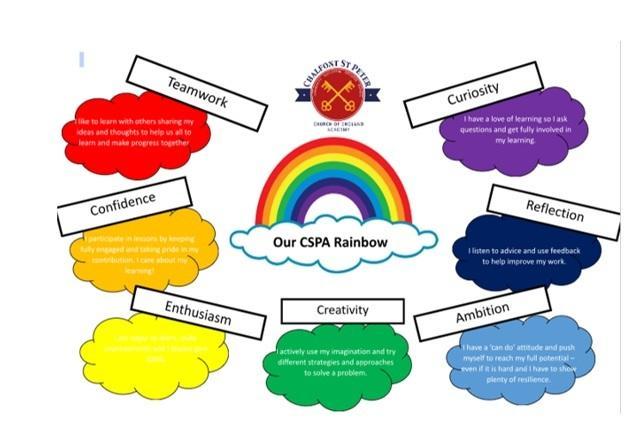
Nurture- the Nest
What is The Nest?
The nest is a special space in the heart of our school, providing a safe and welcoming environment to encourage and develop confidence and self-esteem as a learner. Each focused learning group decides on their own bird-themed name, which is used for them and by them during their time with us in The Nest. It is important to us that each member feels part of a team, where we will also recognise and celebrate each other’s different personalities, strengths, interests and achievements.
What are focused learning groups?
These groups provide an opportunity to focus in on and address any educational, social and emotional needs which may be impacting on a child’s learning, within a small and nurturing group setting.
Through a variety of different learning and support strategies including; creative writing, mindfulness, strategic problem-solving, art, drama, cooking and gardening - our aim is to enhance academic and social development and improve overall confidence. There is a specific focus on developing resilience, learning self-care and self-respect, together with taking pride in behaving well and achieving.
The Nest team will work closely with the year group staff to ensure that, where possible, there is cohesion between the topics covered in the school core curriculum.
The Nest is overseen by Mrs Valentine and run by a team of Learning Support Assistants who have received additional, specific training for this role.
Peer Mentors
Each year our school runs the successful Mind Peer Mentor programme. This is a very exciting project which involves training some of our Year 5 and 6 children to support other children in the playground and to be mental health ambassadors in the school.
Children's Mental Health Week
During Children's Mental Health Week in February, our Peer Mentors were busy promoting mental health in our school, linking in with the theme 'Our Voice Matters' . They lead a whole school collective worship to remind everyone that their voice does matter and to provide some great advice on making sure their voice is listened to.
At the end of the week, they planned a 'Wellbeing Day'. This included an opportunity for children to move to another year group to connect with other children. The Peer Mentors bravely and confidently became teachers to share some key messages and introduce some shared activities for everyone to enjoy. They did a brilliant job!
-
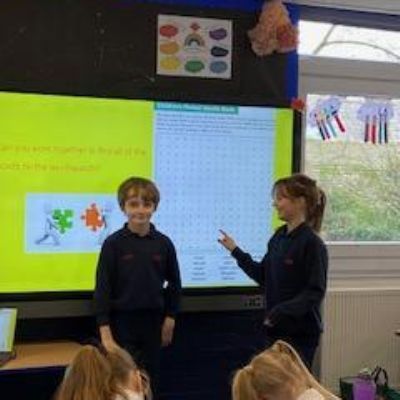
2fd42e48-4281-4c53-8e5c-576fc48bfd711x1
-
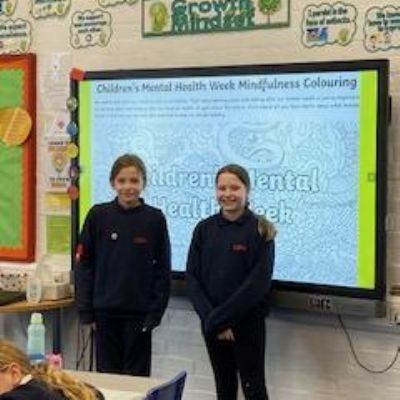
7eb6c032-c50a-45f0-ac02-3eefb6a866b01x1
-

e525d013-e562-444b-bac4-8e9b8d26ae0e1x1
-
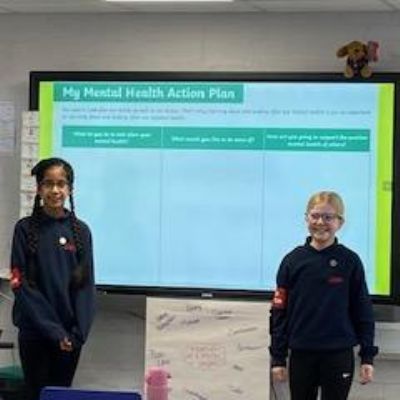
67bddd5e-b505-4229-a451-f0046b99a5bc1x1
-
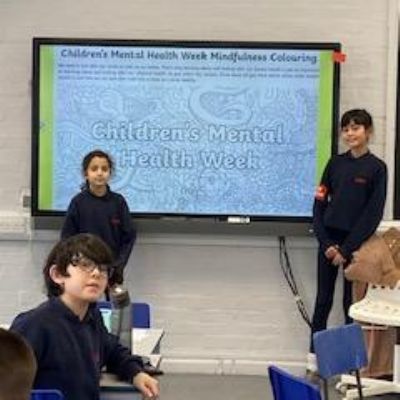
6b7fec2b-f185-4453-9362-7a607f2734a31x1
-

70444d7e-e199-44e0-bbd3-75d8d633a9291x1
-
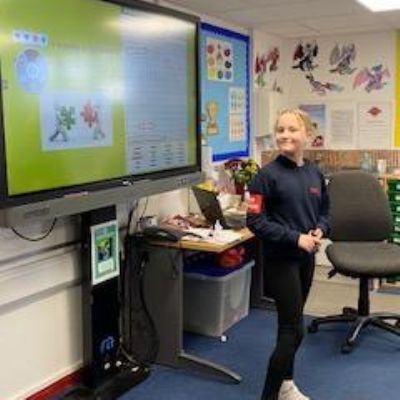
db738eef-b25f-4ec8-a162-d34957d859431x1
-

83efa7a7-f579-4289-8a11-9b10d7a0cae91x1
-
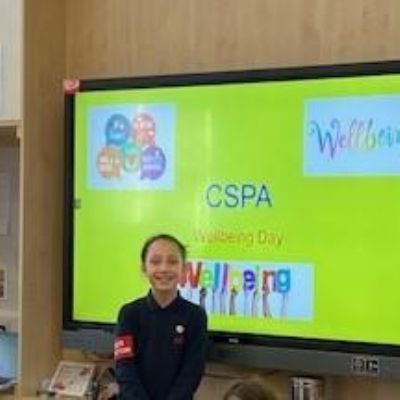
0e4c3623-1fa1-4c0d-97a2-3b9b5c93a6d11x1
-
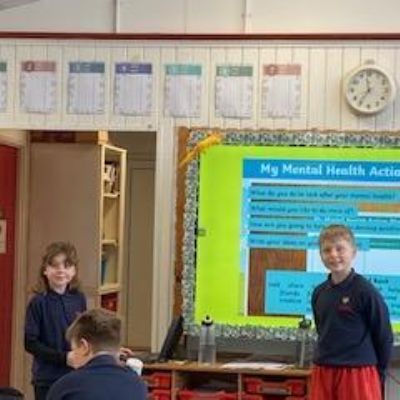
7af5fe04-9510-4efe-872e-c88f6a2e122e1x1
-
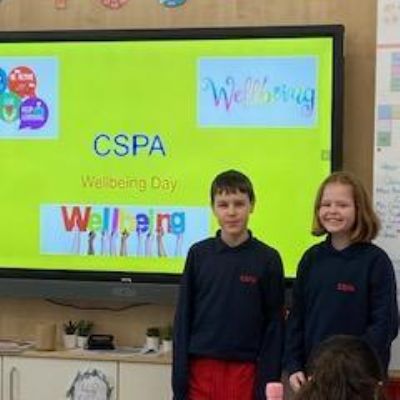
a8ddad02-3d8b-497f-8b65-16fd13181fc91x1
-
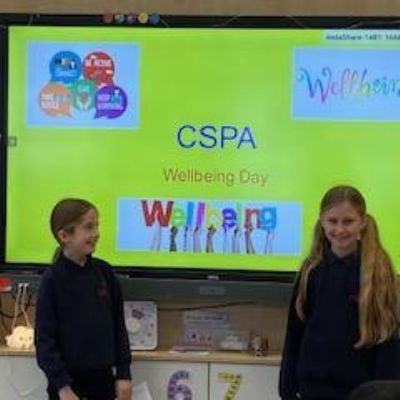
026dcfa4-a7aa-4181-9d1b-69666dbc43121x1
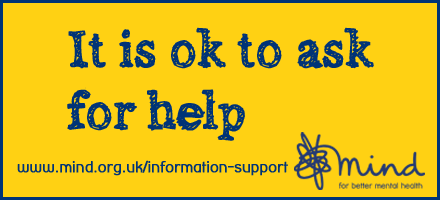
Zones of Regulation
The Zones of Regulation is an internationally renowned intervention which helps children to manage difficult emotions, known as ‘self-regulation’. Self-regulation can go by many names such as ‘self-control’, ‘impulse management’ and ‘self-management’. Self-regulation is best described as the best state of alertness for a situation. For example, when your child takes part in a sports game, they would need to have a higher state of alertness than when, for example, they were working in a library. From time to time, all of us (including adults) find it hard to manage strong feelings such as worry, anger, restlessness, fear or tiredness, and this stops us from getting on with our day effectively. Children who feel these emotions often find it hard to learn and concentrate in school. The Zones of Regulation aims to teach children strategies to help them cope with these feelings so they can get back to feeling calm and ready to learn. These coping strategies are called ‘self-regulation’.
At Chalfont St Peter Church of England Academy, we use the Zones of Regulation throughout the whole school. We want to teach all of our children good coping and regulation strategies so they can help themselves when they experience anxiety and stress. In the classroom, sometimes children panic when faced with a tricky learning problem or challenge. By teaching them how to cope with these feelings might make them better at tackling learning challenges and build better resilience so they don’t give up so easily when faced with difficulty.
We want children at Chalfont St Peter Church of England Academy to grow into successful teenagers then adults. Teaching the children at a young age about managing their feelings will support them in later life so that they don’t turn to negative coping strategies which affect their mental and physical wellbeing.
We aim to help children to:
• Recognise when they are in the different Zones and learn how to change or stay in the Zone they are in.
• Increase their emotional vocabulary so they can explain how they are feeling.
• Recognise when other people are in different Zones, thus developing better empathy.
• Develop an insight into what might make them move into the different Zones.
• Understand that emotions, sensory experiences such as lack of sleep or hunger and their environment might influence which Zone they are in.
• Develop problem-solving skills and resilience
• Identify a range of calming and alerting strategies that support them (known as their personal ‘toolkit’.
What are the different Zones?
Blue Zone: low level of arousal; not ready to learn; feels sad, sick, tired, bored, moving slowly.
Green Zone: calm state of alertness; optimal level to learn; feels happy, calm, feeling okay, focused.
Yellow Zone: heightened state of alertness; elevated emotions; has some control; feels frustrated, worried, silly/wiggly, excited, loss of some control.
Red Zone: heightened state of alertness and intense emotions; not an optimal level for learning; out of control; feels mad/angry, terrified, yelling/hitting, elated, out of control.
We teach the children that everyone experiences all of the Zones. The Red and Yellow zones are not ‘bad’ or ‘naughty’ Zones. All of the Zones are expected at one time or another. We will show them that the Blue Zone, for example, is helpful when you are trying to fall asleep.
We introduce the Zones through discrete teaching lessons and through our PSHE curriculum. We also use the Zones language as part of daily school life so all staff will be refer to them. Some children might prefer not to use the ‘Zones language’ but label the emotions directly – this is fine and encouraged!
Therapy Dog
Therapy dogs have been proven to help develop Pupils’ reading skills, improve behaviour, attendance and academic confidence, as well as increasing student understanding of responsibility and in the development of empathy and nurturing skills. Maisie our therapy dog visits us very Monday afternoon with her owner Tina.
Creative Arts and Play Therapy
Creative Arts and Play Therapy is a mode of therapy that helps children to explore their feelings, to express themselves and to make sense of their life experiences. Play is children’s natural medium to learn, communicate and to explore their worlds. Recovery from difficult life experiences can be facilitated by a Creative Arts and Play Therapist, allowing a child freedom of expression in a safe and trusting environment. Conventional talking therapies may be inappropriate for children and young people who struggle to put their feelings into words. Creative Arts and Play Therapy allows children the opportunity to explore and understand these feelings. It can enable them to shift their perspective of abuse or difficulty so that they are less likely to internalise blame. The resulting empowerment and increased self-esteem can be the springboard to help the child to cope with difficulties in the real world.’
Creative Arts and Play Therapy is an effective intervention for children with a variety of presenting difficulties including:
-
Children or young people who have experienced trauma.
-
Those who have experienced loss.
-
Children who are Young Carers
-
Children who have emotional or behavioural difficulties arising from their experiences.
We employ a Creative Arts and Play Therapist for two half days each week. Janet is a certified Play and Creative Arts Therapist, who has been working one-to-one with children at Chalfont St Peter Church of England Academy for the past four years. She qualified with Play Therapy UK (PTUK) and is a member of the British Association for Counselling and Psychotherapy (BACP)

